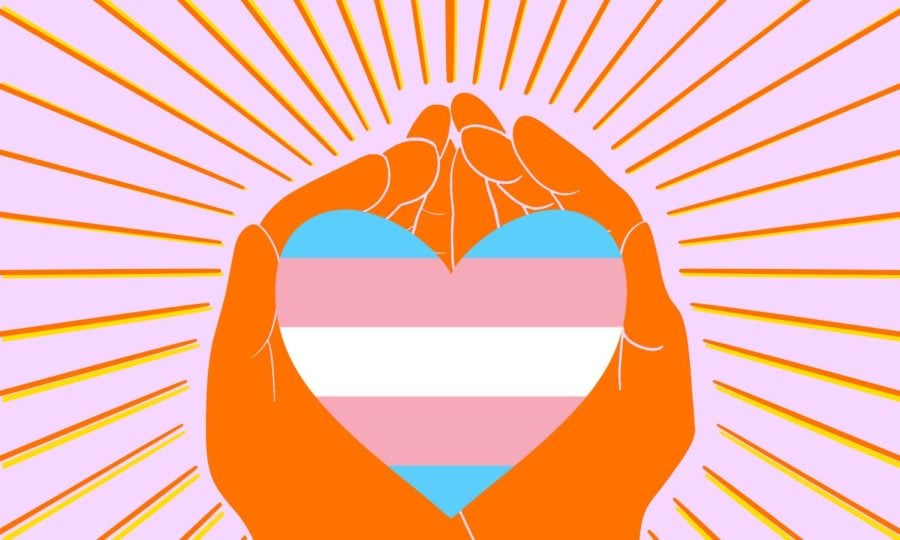Q&A: Sociology Ph.D. student Aven Peters to present research on trans health care disparities at NIH convention
Daily file illustration by Olivia Abeyta
Trans communities face additional barriers in accessing general health care, first-year sociology Ph.D. student Aven Peters found in their research.
March 28, 2023
First-year sociology Ph.D. student Aven Peters is set to present their research on health care access disparities in the trans community at the National Institutes of Health’s “All of Us” Researchers Convention. The event gathers researchers who’ve used the All of Us data set, a large and diverse data collection, to showcase their work.
Peters is part of the All of Us Research Scholars program that provides students mentorship for an eight-month research project. Peters used the All of Us data set to analyze general health care disparities in the transgender community. They said the data is a unique asset to studying trans health, because most surveys don’t have enough trans participants for adequate analysis. About 1,000 trans people participated in the survey they used.
Peters will present their findings at an NIH panel on social determinants of health and health care access Wednesday morning.
This interview has been edited and condensed for clarity.
The Daily: What inspired your personal interest in pursuing this topic?
Peters: I realized that this data set would be helpful for answering a lot of questions about trans health, so I was excited about that. But then when I was looking through the literature, I kept noticing all of the work on trans health was on gender-affirming care, sexual health, mental health and substance use.
Those are really important topics, but I was frustrated because from my personal experience and from the experiences of people that I know, there are also a lot of barriers related to going to the dentist, going to the general practitioner — dealing with more mundane, more general preventive aspects of health. It seems like no one was talking about that, so I wanted to use this data set to explore that.
The Daily: What are some of the barriers trans people face in accessing everyday health care?
Peters: The survey question that I was working with was, “Have you not gotten care in the last 12 months because you’re nervous about seeing a doctor?” Trans people are still three to five times as likely to not see a doctor, because they’re nervous. Some of that could have been attributable to overt discrimination on the part of health care providers. Part of it also is more of a subtle rebuilding of trust that needs to happen between health care providers and the trans community.
Trans people are much less likely to have stable housing than cisgender people, and housing is a major social determinant of health because if you’re worried about where you’re gonna live in the next couple of weeks, you’re not thinking about going to the doctor. The same is true for things like employment and income. Trans people, at least in this sample, were a lot less likely to have health insurance than cisgender people, and that obviously has a huge impact on people’s ability to get care.
There are also everyday logistical things that make it hard to get to the doctor. Some people don’t have transportation when they need it. Some people have a hard time getting time off work to go to a doctor’s appointment. Altogether, there’s an accumulation of things that make it harder for trans people to get care.
The Daily: Why are general health care disparities in the trans community important to highlight? What are the consequences of ignoring this care?
Peters: I deliberately focused on health care in general in this project rather than gender-affirming care or sexual health. General preventive care is really important for everyday health and preventing mortality in ways that I think have not been fully appreciated in the literature on trans health.
When people don’t access routine preventive care they need and when they’re not able to get the specialists that they need, etc., it impacts their health. Even if people are not on board with gender-affirming care, they need to realize that discrimination against trans people, structurally, is impacting their health.
The Daily: Ahead of the talk that you’re about to give, what are you most excited for?
Peters: I always like a good Q&A session because it’s really encouraging when people have paid attention and thought through what you’ve been talking about and are ready to engage. I’m excited about hearing from my fellow presenters, and I’m excited to hear more about what other people have been working on.
I’m also excited to eventually publish this as a paper, because I think it says something that needs to be said that isn’t really out there yet. I’m hoping that it can have a strong policy impact.
Email: [email protected]
Twitter: @joannah_11
Related Stories:
— Northwestern study shows gender-affirming surgery benefits in youth
— Northwestern libraries publishes Bulletin of Applied Transgender Studies
— Student leaders, staff discuss new Gender Sexuality Resource Center


